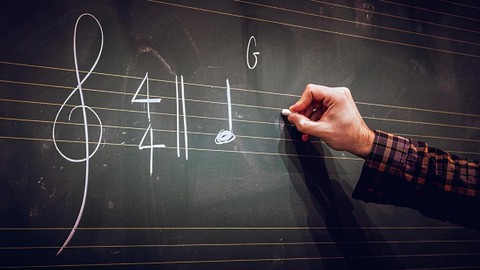
Music Theory for Beginners – Piano, Guitar Violin, etc.
Music Theory for Beginners – Piano, Guitar Violin, etc., available at $79.99, has an average rating of 4.45, with 89 lectures, 6 quizzes, based on 187 reviews, and has 16627 subscribers.
You will learn about You will learn the fundamentals of music You will learn how music is constructed You will learn how to best phrase and perform your songs, by understanding the mechanics behind the songs that you play How to read music Understand rhythm What are scales What are semitones & whole tones What are accidentals Major scales Minor scales What is key signature Determining the key signature for scales Finding the key Chromatic scales Whole tone scales Pentatonic scales The blues scales Octatonic scales What are modes Simple time Simple duple, triple, and quadruple time Compound time Compound duple, triple, and quadruple time Hybrid meters Triplets What are chords Intervals Major & minor chords The dominant 7th chord The diminished 7th chord What are cadences Perfect cadence Plagal cadence Imperfect cadence Transposition Transposing to another clef Transposing to a new key Transposing for other instruments Short score Vs open score Writing Melody Writing a response to the melody Key terms to know This course is ideal for individuals who are This course is for people who have little to no knowledge of Music Theory or For people who tried learning Music Theory on their own but struggled with some of the confusing and tough concepts or For all music lovers; whether you play the piano, the guitar, the violin, some other instrument, or even if you don’t play any instruments… there’s something for everyone here or Those who want to learn how music works and how it is constructed at a core level or Those who want to write their own songs, or learn how others go about writing their songs It is particularly useful for This course is for people who have little to no knowledge of Music Theory or For people who tried learning Music Theory on their own but struggled with some of the confusing and tough concepts or For all music lovers; whether you play the piano, the guitar, the violin, some other instrument, or even if you don’t play any instruments… there’s something for everyone here or Those who want to learn how music works and how it is constructed at a core level or Those who want to write their own songs, or learn how others go about writing their songs.
Enroll now: Music Theory for Beginners – Piano, Guitar Violin, etc.
Summary
Title: Music Theory for Beginners – Piano, Guitar Violin, etc.
Price: $79.99
Average Rating: 4.45
Number of Lectures: 89
Number of Quizzes: 6
Number of Published Lectures: 84
Number of Published Quizzes: 6
Number of Curriculum Items: 95
Number of Published Curriculum Objects: 90
Original Price: $199.99
Quality Status: approved
Status: Live
What You Will Learn
- You will learn the fundamentals of music
- You will learn how music is constructed
- You will learn how to best phrase and perform your songs, by understanding the mechanics behind the songs that you play
- How to read music
- Understand rhythm
- What are scales
- What are semitones & whole tones
- What are accidentals
- Major scales
- Minor scales
- What is key signature
- Determining the key signature for scales
- Finding the key
- Chromatic scales
- Whole tone scales
- Pentatonic scales
- The blues scales
- Octatonic scales
- What are modes
- Simple time
- Simple duple, triple, and quadruple time
- Compound time
- Compound duple, triple, and quadruple time
- Hybrid meters
- Triplets
- What are chords
- Intervals
- Major & minor chords
- The dominant 7th chord
- The diminished 7th chord
- What are cadences
- Perfect cadence
- Plagal cadence
- Imperfect cadence
- Transposition
- Transposing to another clef
- Transposing to a new key
- Transposing for other instruments
- Short score Vs open score
- Writing Melody
- Writing a response to the melody
- Key terms to know
Who Should Attend
- This course is for people who have little to no knowledge of Music Theory
- For people who tried learning Music Theory on their own but struggled with some of the confusing and tough concepts
- For all music lovers; whether you play the piano, the guitar, the violin, some other instrument, or even if you don’t play any instruments… there’s something for everyone here
- Those who want to learn how music works and how it is constructed at a core level
- Those who want to write their own songs, or learn how others go about writing their songs
Target Audiences
- This course is for people who have little to no knowledge of Music Theory
- For people who tried learning Music Theory on their own but struggled with some of the confusing and tough concepts
- For all music lovers; whether you play the piano, the guitar, the violin, some other instrument, or even if you don’t play any instruments… there’s something for everyone here
- Those who want to learn how music works and how it is constructed at a core level
- Those who want to write their own songs, or learn how others go about writing their songs
Hi there, my name is Shervin House. I am a Violin Instructor, and I am certified in the Advanced Rudiments of Music Theory & Harmony by the Royal Conservatory of Music.
Have you always wondered how music is made, or have you ever aspired to one day write your own song? In this course you will learn everything that you will need to know about Music Theory, starting from the very basics and covering everything up to the Advanced Music Theory material, as categorized by the RCM (Royal Conservatory of Music).
-
Jack:“Very thorough, everything is explained clearly and using visuals to make the learning experience easier. Loved the course, could not be happier. I would recommend it to anyone”
This course is for beginners. You don’t need to know anything about Music Theory in order to follow along. In fact we even cover how to read music from the basics in the first unit in order to make sure everyone is able to keep up without any prior knowledge. Furthermore, you can learn and follow the material regardless of what instrument you play; whether you play the piano, the guitar, the violin, or any other instrument.
You will learn how elements such as the key signature and the time stamp can be used as powerful tools in writing music, and how they will set up a blueprint for our song. You will discover how to construct chords, how to write melodies, how to begin and end phrases, how to adjust your music based on the instrument you want to use or the key you wish you play in, and much more..
-
Ben: “Easy to follow, clear, engaging, thorough. If you want to learn music theory, this instructor is your guy”
By the end of this course, you will have a complete understanding of the fundamentals of music theory, as well as gaining the ability to start composing songs like a pro. My aim with this course was to break down all of these complicated concepts and explain them by using visuals and piano keys, so that you will have a far easier time wrapping your head around these confusing topics; in short, I will take you by the hand and walk you through all of these fundamentals step by step.
-
Jamie:“This was a very in depth and interesting course. I didn’t know much about Music Theory, but I was able to follow along no problem. Definitely recommend it..”
What can you expect from this course?
-
The most in depth music theory course online
-
A complete guide for those who are beginners to music theory, or even music in general
-
All the basics covered, material such as how to read music, how rhythm works, etc.
-
All questions answered within 24 hours
-
All the fundamentals covered, all through beginner, intermediate, and advanced rudiments of music theory
-
And of course… 30 day money back guarantee! (No questions asked)
If you don’t know music theory, or if you have tried learning on your own and found it to be super confusing and difficult to understand, then let me reassure you that you have nothing to worry about; follow me, and I will be your humble tour guide into the crazy world of music.
Course Curriculum
Chapter 1: Introduction + Reading Music for Beginners
Lecture 1: Introduction – Music Theory
Lecture 2: DOWNLOAD FILE – Staff Paper
Lecture 3: Reading Music – Staff & Clefs
Lecture 4: Reading Music – Length of Notes
Lecture 5: Reading Music – Time Stamps
Lecture 6: Reading Music – Other Elements
Lecture 7: Reading Music – Piano Score (The Grand Staff)
Lecture 8: Reading Music – Understanding Rhythm
Chapter 2: Major & Minor Scales – Music Theory
Lecture 1: What are Scales? – Music Theory
Lecture 2: Semitones, Whole Tones, & Accidentals – Music Theory
Lecture 3: DOWNLOAD FILE – Piano Keys Illustration Handout
Lecture 4: Major Scales – Music Theory
Lecture 5: Minor Scales – Music Theory
Lecture 6: Join the Facebook Group
Chapter 3: Key Signatures In Depth – Music Theory
Lecture 1: Reviewing Accidentals & Intro to Key Signature – Music Theory
Lecture 2: Determining the Key Signature for Scales – Music Theory
Lecture 3: Finding the Key of a Melody – Music Theory
Chapter 4: ASSIGNMENTS – Scales & Key Signatures
Lecture 1: Assignment 1 – Major Scales
Lecture 2: Answering Assignment 1 – Music Theory
Lecture 3: Assignment 2 – Minor Scales
Lecture 4: Answering Assignment 2 – Music Theory
Chapter 5: The Scale Types You Must Know – Music Theory
Lecture 1: Chromatic Scales – Music Theory
Lecture 2: Whole Tone Scales – Music Theory
Lecture 3: Pentatonic Scales – Music Theory
Lecture 4: The Blues Scales – Music Theory
Lecture 5: Octatonic Scales – Music Theory
Lecture 6: Modes – Music Theory
Chapter 6: Types of Time Signatures – Music Theory
Lecture 1: Simple Time – Music Theory
Lecture 2: Compound Time – Music Theory
Lecture 3: Hybrid Meters – Music Theory
Chapter 7: ASSIGNMENTS – Time Signature
Lecture 1: Assignment 3 – Simple Time
Lecture 2: Answering Assignment 3 – Music Theory
Lecture 3: Assignment 4 – Compound Time
Lecture 4: Answering Assignment 4 – Music Theory
Lecture 5: Assignment 5 – Hybrid Meters
Lecture 6: Answering Assignment 5 – Music Theory
Chapter 8: Chords – Music Theory
Lecture 1: Intervals – Music Theory
Lecture 2: Major & Minor Chords – Music Theory
Lecture 3: The Dominant 7th Chord – Music Theory
Lecture 4: The Diminished 7th Chord – Music Theory
Chapter 9: Cadences – Music Theory
Lecture 1: What are Cadences? – Music Theory
Lecture 2: The Perfect Cadence – Music Theory
Lecture 3: The Plagal Cadence – Music Theory
Lecture 4: The Imperfect Cadence – Music Theory
Chapter 10: Transposition – Music Theory
Lecture 1: What is Transposition? – Music Theory
Lecture 2: Transposing to Another Clef – Music Theory
Lecture 3: Transposing to Another Key – Music Theory
Lecture 4: Transposing for Other Instruments – Music Theory
Chapter 11: The Fundamentals of Composition
Lecture 1: Shot Score Vs Open Score – Music Theory
Lecture 2: Writing Melody – Music Theory
Lecture 3: Writing a Response to the Melody – Music Theory
Chapter 12: What's Next…
Lecture 1: What's Next?
Chapter 13: Bonus Preview – Violin Beginner Course
Lecture 1: Intro to the violin course
Lecture 2: Parts of the violin
Lecture 3: Shoulder rest and how to use it
Lecture 4: Rosin and how to use it
Lecture 5: How to tune the violin
Lecture 6: Holding the violin the right way
Lecture 7: Holding the bow the right way
Chapter 14: Bonus Lecture
Lecture 1: Bonus Lecture
Chapter 15: Resources – Drum Tracks (For Practicing Rhythm)
Lecture 1: 54 bpm (beats per minute) drum track
Lecture 2: 57 bpm drum track
Lecture 3: 60 bpm drum track
Lecture 4: 63 bpm drum track
Lecture 5: 66 bpm drum track
Lecture 6: 69 bpm drum track
Lecture 7: 72 bpm drum track
Lecture 8: 75 bpm drum track
Lecture 9: 78 bpm drum track
Lecture 10: 81 bpm drum track
Lecture 11: 84 bpm drum track
Lecture 12: 90 bpm drum track
Lecture 13: 96 bpm drum track
Lecture 14: 104 bpm drum track
Lecture 15: 112 bpm drum track
Lecture 16: 120 bpm drum track
Lecture 17: 128 bpm drum track
Lecture 18: 136 bpm drum track
Lecture 19: 144 bpm drum track
Instructors
-
Shervin House
Best-Selling Instructor & YouTuber
Rating Distribution
- 1 stars: 1 votes
- 2 stars: 3 votes
- 3 stars: 20 votes
- 4 stars: 45 votes
- 5 stars: 118 votes
Frequently Asked Questions
How long do I have access to the course materials?
You can view and review the lecture materials indefinitely, like an on-demand channel.
Can I take my courses with me wherever I go?
Definitely! If you have an internet connection, courses on Udemy are available on any device at any time. If you don’t have an internet connection, some instructors also let their students download course lectures. That’s up to the instructor though, so make sure you get on their good side!
You may also like
- Best Public Speaking Courses to Learn in March 2025
- Best Affiliate Marketing Courses to Learn in March 2025
- Best Email Marketing Courses to Learn in March 2025
- Best Social Media Management Courses to Learn in March 2025
- Best SEO Optimization Courses to Learn in March 2025
- Best Content Creation Courses to Learn in March 2025
- Best Game Development Courses to Learn in March 2025
- Best Software Testing Courses to Learn in March 2025
- Best Big Data Courses to Learn in March 2025
- Best Internet Of Things Courses to Learn in March 2025
- Best Quantum Computing Courses to Learn in March 2025
- Best Cloud Computing Courses to Learn in March 2025
- Best 3d Modeling Courses to Learn in March 2025
- Best Mobile App Development Courses to Learn in March 2025
- Best Graphic Design Courses to Learn in March 2025
- Best Videography Courses to Learn in March 2025
- Best Photography Courses to Learn in March 2025
- Best Language Learning Courses to Learn in March 2025
- Best Product Management Courses to Learn in March 2025
- Best Investing Courses to Learn in March 2025






















